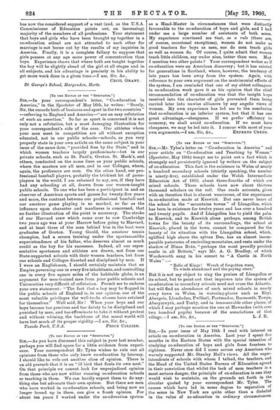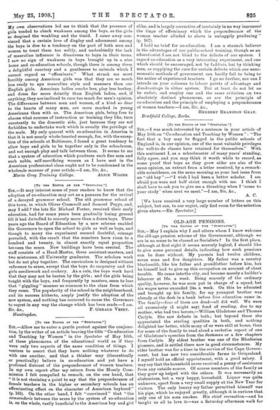[TO THE EDITOR OF VIZ " SPECTATOR." . 1 SIR, — In your issue
of May 16th I read with interest an article on co-education in America. Last year I spent five months in the Eastern States with the special intention of studying co-education of boys and girls from fourteen to eighteen. Never once did I come across any American who warmly supported Mr. Stanley Hall's views. All the super- intendents of schools with whom I talked, the teachers, and the Head of the United States Bureau of Education agreed in their conviction that whilst the lack of men teachers is a most serious danger, the principle of co-education is one they would wish to maintain, on the grounds set forth in the circular quoted by your correspondent Mr. Tylee. The causes which have led in some degree to separation of the sexes in New York are quite other than a disbelief in the value of co-education in ordinary circumstances.
My own observations led me to think that the presence of girls tended to check weakness among the boys, as the girls so despised the weakling and the timid. I came away con- vinced that a certain love of display and adornment among the boys. is due to a tendency on the part of both men and women to treat them too softly, and undoubtedly the lack of masculine influence is disastrous to boys in their teens. I saw no sign of weakness in boys brought up in a nice home and co-education schools, though there is among them a delightful courtesy and a gentleness to animals which I cannot regard as "effeminate." What struck me most forcibly among American girls was that they are so much less ready to ape masculine style and manners than our English girls. American ladies smoke less, play less hockey, and dress far more daintily than English ladies, and, if anything, they are inclined to care too much for men's opinion. The differences between men and women, of a kind so dear to the hearts of many men, are more marked in young Americans than with us. The American girls, being free to choose what courses of instruction or training they like, turn constantly to the domestic side, just because they are not forbidden to undertake work which is usually the privilege of the male. My only quarrel with co-education in America is that it is not nearly whole-hearted enough, for, with the excep- tion of the schools at Baltimore, I found a great tendency to allow boys and girls to be together only in the schoolroom, and not enough play and talk between them. It seems to me that a system of education which produces such fine men and such noble, self-sacrificing women as I have met in the American professional class ought not to be condemned in the wholesale manner of your article.—I am, Sir, &c., Maria Grey Training College. ALICE WOODS.







































 Previous page
Previous page